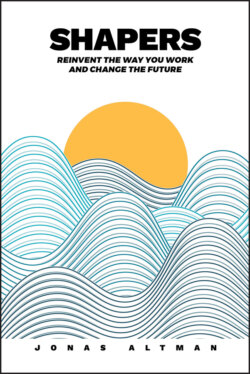Читать книгу Shapers - Jonas Altman - Страница 12
CHAPTER 2 A SHORT HISTORY OF WORK
ОглавлениеThroughout history, work was mostly miserable with little if any room for self‐expression. As punishment for the Original sin, drudgery was a potential stairway to heaven. Modern management commands productivity and progress while our attitudes towards work becomes bound to time on the clock. With the advent of the Internet, we are untethered from our desk and provided with endless opportunities to express ourselves. We're now set on giving life to the multitude of selves within us.
The port of Athens, with its colourful walks of life, was the perfect backdrop to waxing lyrical on the best way to live. Plato and his gang (Socrates, Glaucon, and co.) would cruise the buzzing streets of Piraeus intoxicated by the sights and sea. It was in this serene setting that Plato began shaping the world's most important philosophical work.
Platonic idealism (alongside the ancient Greek philosophies) was instrumental in giving rise to democracy and laying the bedrock of modern Western civilisation. ‘There will be no end to the troubles of states, or of humanity itself, till philosophers become kings in this world, or till those we now call kings and rulers really and truly become philosophers,’ is one of his finer lines.
In Plato's Republic, the ideal state is divided into three distinct classes: the Producers, who provide material and functional needs; the Auxiliaries, who defend the state; and the Guardians, who govern it. Justice is maintained when every person within a respective class performs his or her proper function in society.
For a long time, I was hung up on a philosopher who lived some 2400 years ago proclaiming the best way for everyone to live, and in particular how I should live. Oh, the gall to speak of the desires of my soul and then exclude them from expression! Admittedly those were different times and I've grossly oversimplified things.
Still, it would be fun to see the expression on Plato's face were he dropped into a present‐day Shibuya Crossing in Tokyo. Gobsmacked! He rubs his eyes repeatedly, not from the neon lights (although those nearly blind him) but from how technology and mankind move in unison together. With his jaw dropped well below his chiton, we could explain that the world is connected through a vast wired network, that large containers whisk us through the sky high above oceans, and from time to time we travel to other bodies in the galaxy.
Or better yet, if we could travel back in time to Piraeus circa 380 BC and demonstrate our progress as a civilisation. As writer Tom Streithorst hints, ‘With an AK‐47, a home brewing kit, or a battery‐powered vibrator, startled [onlookers] would worship at our feet.’ Imagine still yet, if we were to explain that we've designed machines that actually learn. They can play, paint, sing, write, dance, see, drive, fly and so much more—abiding by whatever program we set. Dearest Plato, the cherished functions of the soul are now augmented by mechanical minds that we've designed in our image.
And technological advancements have shaped and continue to transform work in unimaginable ways. We've even come up with a snazzy name for this era: the Fourth Industrial Revolution. These super‐intelligent instruments are integral to our lives and when used, not abused, can make our work culture oh so colourful.
